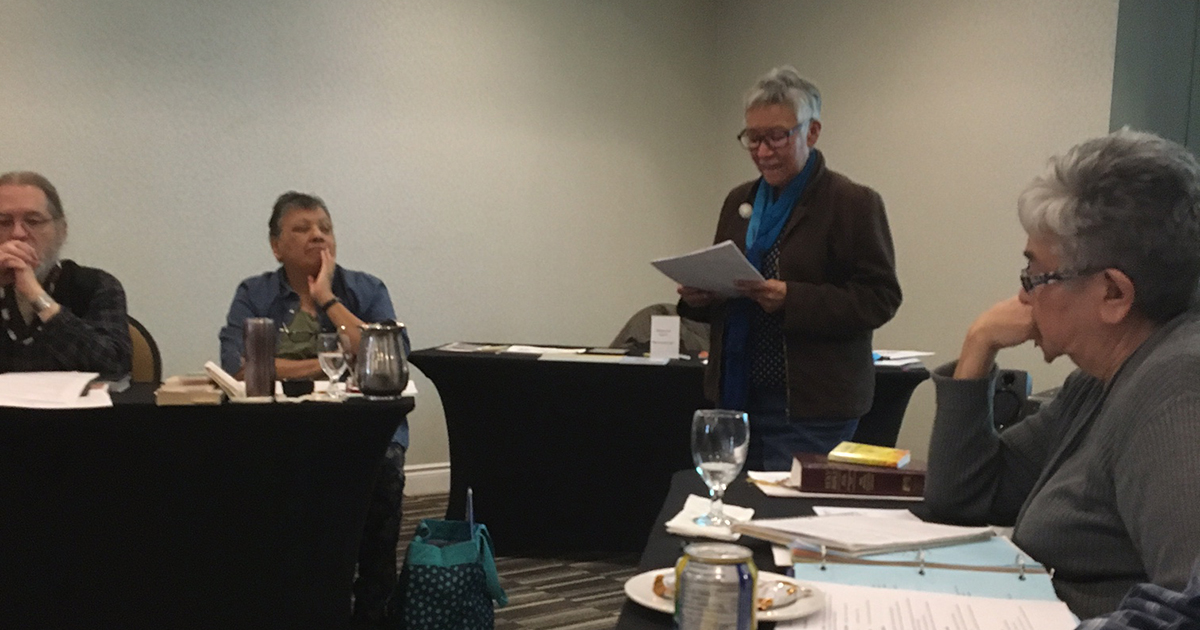Plans for this year’s Sacred Circle were the major focus at the most recent meeting of the Anglican Council of Indigenous Peoples (ACIP), which took place from Feb. 21-25 in Toronto.
Caroline Chum, co-chair of ACIP along with Bishop Sidney Black, said that the main issues discussed included arrangements for Sacred Circle and the way towards a self-determining national indigenous ministry.
“At our last meeting, we managed to get a lot of work done, and we still have so much more to do before Sacred Circle and then General Synod 2019,” Chum said.
The next Sacred Circle will take place from August 6-11, 2018 at the University of Northern British Columbia in Prince George, B.C. The theme of the gathering is Making and Strengthening Disciples: Reborn in Water and Spirit.
One of the topics under discussion at the ACIP meeting was a proposal, currently in development from the Governance Working Group, that would allow Sacred Circle to change its structure, rules, and Canon XXII without going through General Synod.
National Indigenous Anglican Bishop Mark MacDonald said that the proposal “would basically give autonomy to the Sacred Circle, in a way similar to a provincial synod having autonomy from General Synod.
“One of the themes that we’re dealing with very much is the idea of self-determination,” he added. “We talked about it a lot in the ACIP meeting, and we will focus on that at Sacred Circle as well.”
Self-determination was the main focus of The Road to Warm Springs, the historic national consultation that took place last year in Pinawa, Manitoba.
Experiences of the Pinawa gathering were woven throughout discussion at the ACIP meeting, with members taking time to respond to a report from the co-chairs of the consultation.
“ACIP appeared grateful for the kind of broad support that was witnessed at Pinawa from the larger church for the Indigenous project of self-determination,” Bishop MacDonald said. “And I think that the attitude was really, ‘Let’s get down to work.’”
Non-stipendiary clergy
While long-term plans towards self-determination remain a major focus, members also discussed ongoing issues related to Indigenous ministry—chief among them the need to support non-stipendiary clergy and to address intergenerational trauma in Indigenous communities.
The National Indigenous Anglican Bishop said that non-stipendiary clergy would be a major topic of conversation in the lead-up to Sacred Circle and at the August gathering itself.
He described a “dual focus” in discussions around non-stipendiary clergy as part of a broader strategy for Indigenous ministry across the Anglican Church of Canada, characterized by two main ideas: providing more direct and concrete support to unpaid clergy, and providing support through development of ministry in local communities.
“There certainly needs to be more money and resources available to support our Indigenous clergy in their communities,” Bishop MacDonald said. “But also, we need to develop a broad range of ministries, volunteer and paid, to respond to the great needs that we have in our communities.”
“I think we’re very much of the opinion that to make someone serve on their own, without pay, is a very cruel situation, and we really need to make a dedicated effort to change the situation as it exists today,” he added. “Ministry in our communities is very challenging, and it needs to be attended to.”
Interested in keeping up-to-date on news, opinion, events and resources from the Anglican Church of Canada? Sign up for our email alerts .

